PolyMide PA12-CF-Black
Features
- Industrial nylon – PA12, reinforced with carbon fibre, provides high stiffness and mechanical performance with lower moisture sensitivity compared to PA6 or PA612.
- Reinforced with 10% chopped fibre providing excellent tensile adhesion, stiffness and high strength to weight ratio.
- Lowest moisture sensitivity among Polymaker Nylon products for best stability in real-world applications.
- Industrial PA12-CF shows outstanding properties even after conditioning or moisture saturation.
- High heat resistance up to 131℃ HDT (0.45 MPa) after annealing.
- Excellent dimensional stability during printing.
- Compatible with PolySupport for PA12, tear-off bearing material.
- Cardboard spool and packaging (made of 100% recycled cardboard)
- 500 g
PA12 is very abrasive. For optimum printing results, we highly recommend using hardened steel nozzles. See settings and specifications for additional notes.
View
PolyMide™ is a family of nylon/polyamide based filaments. Manufactured using Polymaker’s Warp-Free™ technology, PolyMide™ filaments provide the engineering properties inherent in nylon and are easy to print.
PolyMide™️ PA12-CF is a carbon fiber reinforced PA12 (Nylon 12) filament containing 10% by weight chopped carbon fiber. Due to the low moisture sensitivity of PA12, this product features outstanding mechanical and thermal properties even after the moisture conditioning process. Across Polymakers PolyMide™️ range of nylon filaments, PA12-CF offers the lowest moisture sensitivity, which improves the stability and predictability of parts in real-world conditions. Combined with the ease of printing with Warp-Free™ and Fiber-Adhesion™ technologies, this product is ideal for creating production tools, jigs and fixtures with stable and high stiffness, tensile strength, improved z-axis strength and low moisture sensitivity.
Tip – Although PA12 is less sensitive to moisture than PA6 or PA612, we highly recommend using a wear-resistant nozzle, running it through a PolyBox™ or other filament dryer, and keeping it in dry conditions (15% relative humidity or less) at all times to maintain the best print results. Please refer to the “Specifications and Frequently Asked Questions” section for data, annealing and additional tips.
Properties
- Lowest Moisture Sensitivity – PolyMide™ PA12-CF is a long-chain nylon filament that offers the lowest moisture sensitivity of Polymakers’ entire nylon filament line. When nylon parts absorb moisture from the air, the water molecule increases the toughness and reduces the strength and stiffness. PolyMide™ PA12-CF is much more stable than PA6 or PA612, meaning that PolyMide™ PA12-CF shows less change in performance from dry to wet conditions and therefore provides more predictable performance in real-world applications, regardless of humidity or environmental conditions.
- Excellent hardness and strength – PolyMide™ PA12-CF combines high hardness, tensile strength, heat resistance and lowest moisture sensitivity to provide consistent mechanical properties regardless of the operating environment. While PolyMide™ PA6-CF outperforms PA12-CF in dry properties, in the wet PolyMide™ PA12-CF outperforms PA6-CF when strength and stiffness are considered.
- Excellent Heat Resistance – Featuring a deflection temperature of up to 131°C after annealing[1], PolyMide™ PA12-CF offers excellent heat resistance for operation in demanding environments where heat and stress are critical design factors.
- Exceptional Layer Adhesion – Most fiber-reinforced materials show a reduction in layer adhesion along the Z-axis compared to their non-fiber-reinforced nylon counterparts, resulting in a part that is stronger only along the X-Y axis, but detrimental to the Z-axis. Polymakers Fiber Adhesion™ technology improves the layer adhesion of fiber-reinforced materials by optimizing fiber surface chemistry to achieve better dispersion and bonding to the matrix. Incorporating this technology into PolyMide™ PA12-CF not only solves this problem, but actually increases tensile strength along the Z-axis, creating more isotropic parts that are strong in every direction.
- Warp-Free™ – Warp-Free™ technology enables the production of nylon-based filaments that can be 3D printed with excellent dimensional stability and virtually zero distortion. This is achieved through fine control of the nylon’s microstructure and crystallization behavior, allowing the material to fully release internal stress before curing. The Warp-Free™ technology in PolyMide™ PA12-CF is designed to work best at minimum bed temperatures.
- Surface finish and printability – PolyMide™ PA12-CF displays prototypes, production fixtures and functional parts with excellent surface finish due to PolyMide™ PA12-CF’s superior flowability and lower fiber content compared to PolyMide™ PA6-CF. Unlike many other nylon filaments, PolyMide™ PA12-CF is extremely easy to handle, exhibiting excellent dimensional stability. It is compatible with most filament based 3D printers that can reach 260°C nozzle temperature and no bed or chamber heating is required!
- Uncompromising Quality – Polymakers’ industry-leading quality control process and rigorous in-house testing ensures reliable printing and consistency across all spools and batches.
[1] PolyMide™ PA12-CF exhibits the best mechanical and thermal properties when fully crystallized. The printed part will not reach full crystallization during the printing process, an additional step is required: Annealing. PolyMide™ PA12-CF can be annealed in an oven at 80˚C for 6 hours immediately after the printing process.
Settings when printing
| Nozzle temperature: | 260°C – 300°C |
|---|---|
| Pad Temperature: | 25°C – 50°C*
*DO NOT exceed 50°C! |
| Substrate Material: | It is compatible with the most common surfaces. Apply a thin layer of adhesive to the build plate. |
| Treatment of the pad surface: | PVA , PVP stick adhesive or EcoFixy. |
| Fan: | OFF |
| Print speed: | 30 mm/s – 60 mm/s |
| Retraction: | Ideal retraction settings vary from printer to printer and depend on the host. The following settings are a good starting point for many machines. Direct Drive: 3 mm retraction distance at 50 mm/s retraction speed Bowden: 6 mm retraction distance at 60 mm/s retraction speed |
| Incloser: | Not required, but helpful to keep out drafts and maintain a stable printing environment. |
| Heating chamber: | Not recommended. |
| Recommended materials for reports: | Single extrusion: Self-support If PolyMide™ PA12-CF is used as a self-support material, please remove the support structure before excessive moisture absorption. Otherwise, the support structure may permanently adhere to the model. Double extrusion: |
Based on a 0.4 mm nozzle. Printing conditions may vary for different printers with higher speeds/rates and nozzle diameters. Brass nozzles give better thermal conductivity than hardened nozzles, for example hardened steel, so depending on your 3D printer you may need to print at a higher extrusion temperature when using special nozzles to ensure the correct extrusion temperature is achieved.
Unlike other nylon filaments that are known to warp, PolyMide™ PA12 is designed to print easily without a heated bed or casing. The extra heat is not beneficial to the printing process, so if you are using an industrial 3D printer, we highly recommend turning off the heated chamber and not exceeding a substrate temperature of 50°C.
We highly recommend using a wear resistant nozzle when printing Polymide™ PA12-CF. The second consideration when printing on nylon is moisture protection. See “Storage and Drying” details below for instructions on protecting PolyMide™ PA12.
Annealing of PA12
For best mechanical performance, annealing of PolyMide™ PA12-CF printed parts is recommended. Annealing is the process of heating printed parts at a specific temperature for a specific period of time. PolyMide™ PA12-CF exhibits outstanding mechanical and thermal properties when fully crystallized. The printed part will not reach full crystallization after the printing process and annealing shortly after the printing process is necessary to complete this step.
Settings for annealing – 80˚C for 6 hours.
Compatibility
PolyMide™ PA12-CF has been developed so that users can print strong carbon fiber filled parts with excellent layer adhesion. Because the carbon fibers in this material are highly abrasive, we recommend that customers first check to see if their 3D printer is equipped to print abrasive materials before purchasing this product.
Besides abrasion resistance, there are several important considerations for this material that we recommend.
Reinforced filaments are usually much stiffer than other standard filaments and this can cause problems when passing the filament through the printer’s feed system. For a steady and uninterrupted filament flow, it is recommended that you take extra care and ensure that your filament feed system is smooth and with minimal bends. Brass nozzles provide better thermal conductivity than hardened nozzles, such as stainless steel. Depending on your 3D printer, higher extrusion temperatures may be required when using special nozzles to ensure the correct extrusion temperature is achieved.
Of course, with thousands of unique 3D printer models on the market, we can’t guarantee that every filament type will work with every 3D printer.
Technical data
All test specimens were printed under the following conditions: nozzle temperature = 300˚C, cooling fan = OFF, build plate temperature = 45˚C, leachate = 100%, ambient temperature = 25 – 50˚C.
All specimens were annealed prior to testing.
Thermal properties
| Value | Method of testing | |
| Glass transition temperature | °C | DSC, 10°C/min |
| Heat deflection temperature 0.45 MPa | 131°C | ISO 75 0.45MPa |
| Heat deflection temperature 1.8 MPa | 105°C | ISO 75 1.8MPa |
| Vicat softening temperature | °C | ISO 306, GB/T 1633 |
MECHANICAL PROPERTIES IN DRY STATE
All specimens were annealed at 80˚C for 24 hours and dried for 48 hours prior to testing.
| Value | Method of testing | |
| Jung’s module (X-Y) |
3,304 MPa | ISO 527, GB/T 1040 |
| Tensile strength (X-Y) |
71.6 MPa | ISO 527, GB/T 1040 |
| Tensile strength (Z) |
43.3 MPa | ISO 527, GB/T 1040 |
| Bending force (X-Y) |
109.9 MPa | ISO 178, GB/T 9341 |
| Sharpey impact strength (X-Y) |
12.5 kJ/m2 | ISO 179, GB/T 9343 |
MECHANICAL PROPERTIES CONDITIONED BY MOISTURE
All specimens were annealed at 80˚C for 24 hours and moisture conditioned.
| Value | Method of testing | |
| Jung’s module (X-Y) |
3,054 MPa | ISO 527, GB/T 1040 |
| Tensile strength (X-Y) |
73.4 MPa | ISO 527, GB/T 1040 |
| Tensile strength (Z) |
42 MPa | ISO 527, GB/T 1040 |
| Bending force (X-Y) |
100.9 MPa | ISO 178, GB/T 9341 |
| Sharpey impact strength (X-Y) |
9.2 kJ/m2 | ISO 179, GB/T 9343 |
The typical values presented in the Polymaker data sheet are for reference and comparison only. Due to the nature of 3D printing, they should not be used for design specification or quality control purposes.
Storage and drying
Nylon filaments are highly hygroscopic, meaning they quickly absorb moisture from the air, which can affect the print quality and strength of printed parts. Before packaging, PolyMide™ PA12-CF is dried to ensure the best print quality, and the filaments are vacuum sealed in a resealable vacuum bag to protect the filaments from moisture.
- When opening, carefully open the resealable pouch, remove the spool and close the pouch back to retain the desiccant bag.
- Print PolyMide PA12-CF from a dry box with a relative humidity of 10 – 15%, which will protect the filament from absorbing moisture. We recommend Polymaker’s PolyBox™, which uses a desiccant to preserve the filament in dry conditions (relative humidity 15% or less) without using heat. Dry boxes with a heating element can destroy plastic filaments if used intensively.
- After printing is complete, PolyMide™ PA12-CF can be stored in the PolyBox™, making sure to monitor and maintain the dehumidifier to keep relative humidity below 15%. If the PolyBox™ is not in use, the filament can be resealed in the resealable bag at the end of printing. In both situations, it is recommended to store the filament away from sunlight for long-term storage and replace/dry the desiccant as needed.
These recommendations are ultimately to prevent moisture absorption by the filament in the first place. If you hear popping sounds and notice that the surface quality of your print is uneven or the color is not consistent, this is a likely indicator that the vellum has absorbed too much moisture and can be removed. PolyMide™ PA12-CF spools can be dried in a preheated convection oven at 80˚C for up to 12 hours.
Although drying is an appropriate solution, it is highly recommended not to over-dry the filament, but instead to take precautions to prevent moisture absorption. Continuous drying of any plastic can make it more brittle, and long-term storage of filaments with moisture content can result in greater filament brittleness due to hydrolysis.
Frequently Asked Questions
Question : What is a “dry” and “wet” condition?
A: Nylon 6 and Nylon 12 materials absorb moisture not only as a filament but also in the final printed part, we call this process moisture conditioning. The “Dry” state is the printed part immediately after annealing and the “Wet” state represents the mechanical properties after absorbing moisture from the air, there is a third “Saturated” state which represents the properties if the material is immersed in water. As the printed part absorbs moisture, it will become more flexible and impact resistant, with a reduction in stiffness and tensile strength compared to its dry state.
Nylons with a shorter chain, such as PA6 or PA612, are able to absorb more moisture than nylons with a longer chain, such as PA11 and PA12, thus nylons with a longer chain show less change in characteristics between the dry and wet states, and nylons with a shorter chain show a greater change. PA12-CF is less sensitive to moisture than PA6-CF or PA612-CF and therefore has less change in mechanical properties under real conditions. It is generally assumed that PolyMide™ PA12-CF 3D prints will eventually reach their “wet” state, but there are many cases where the part may never become moisture resistant. Examples include components operating in high temperature environments, 3D prints that have been post-processed and protected with a moisture barrier, or perhaps for applications where PolyMide™ PA12-CF has been dipped in a specific chemical or oil.
Q: Can I print this material without wear-resistant hardware (nozzle, etc.)?
A: PolyMide™ PA12-CF contains 10% by weight chopped carbon fiber, making it very abrasive. It is important to have a wear resistant nozzle and hardware when printing this material. PolyMide™ PA12-CF can easily damage a brass nozzle after a few hundred grams of printing. Hardened nozzles are more expensive than regular brass nozzles, so it is important to consider the amount of material that is planned to be used. For some users it may be more cost effective to destroy one nozzle for some prints, but please keep in mind that users are responsible for all “wear and tear” on the printer.
Q: How well does Polymakers Warp-Free™ technology work?
A: With Polymakers Warp-Free technology, more users can effectively print PA12-CF with better dimensional stability than comparative nylon products. This technology works best when printing with low bed/chamber temperatures. Since the warping behavior of nylon materials is partially related to the degree of crystallization during printing. If the user is printing with a high temperature heated bed or chamber, the heat will increase the rate of crystallization and cause the part to deform.
Q: Is it necessary to anneal PolyMide™ PA12-CF?
A: After printing, annealing the PolyMide™ PA12 prints will provide the highest degree of crystallinity. This is a recommended step as it allows end users to get the best properties and performance from their parts. PolyMide™ PA12 can be annealed in a convection oven at 80˚C for 6 hours. Of course, annealing may not be necessary for applications that do not require the best thermal or mechanical properties. In some rare cases with fine or thin geometries, different annealing instructions or design considerations may be necessary to achieve the best results.
Q: Will this thread absorb moisture?
A: Yes, polyamides are hygroscopic, which means they absorb moisture from the air. Some grades are more sensitive to moisture than others, but regardless it is important to keep all nylon filaments dry for the best printing process. Polymaker’s nylon filaments are dried right from the factory to ensure customers can achieve excellent results right away, we recommend keeping your PolyMide™ PA12-CF spool dry as moisture can significantly reduce mechanical properties and cause printing defects such as leakage and poor surface quality. To prevent moisture from absorbing into your filaments, we recommend using a PolyBox™ or other filament dryer that provides a stable, low moisture filament storage solution during and between printing. If the PolyMide™ PA12-CFs appear to have absorbed too much moisture, they can be dried in a preheated convection oven for 12 hours at 80˚C.
Q: Is PolyMide™ PA12-CF suitable for high humidity or “wet” applications?
A: PolyMide™ PA12-CF is the best and most stable choice for high humidity applications compared to PA6-CF or PA612-CF. Parts dipped in PolyMide™ PA12-CF will perform better than those printed in PA6-CF, with better strength, stiffness and dimensional stability, making it a suitable choice for real-world applications. If moisture sensitivity in real-world applications is less of a concern, PolyMide™ PA6-CF may be a good fit, and if you are looking for a combination of the mechanical properties offered by PA6 and are concerned about moisture sensitivity, PolyMide™ PA612-CF may be a good option to consider.
Q: What auxiliary materials can I use with this product?
A: For multi-material printers, it is recommended that you print with Polymaker’s PolySupport™ for PA12 , a special tear-away support material for Polymaker’s long-strand nylon filaments. PolySupport™ for PA12 works best for 3D printing geometric models, such as jigs and fixtures, or for covering parts, as PolySupport™ for PA12 will be removed faster and easier than a solvent support.
Q: Do I need to rewind this thread if I want to use it with another spool?
A: We strongly recommend not to tamper with the product by rewinding. All Polymaker filaments are wound with tension but without strain. Rewinding completely rearranges the curvature of the coil and this tension over time can cause most plastics to catastrophically break. If for some reason your printer is blocked from mounting smaller than standard size spools, there may be safe print adapters or external mounting solutions available.
Don’t know where to start? Or which thread would be right for your application? We have a wide range of support options, including phone support. Contact us today!
Polymaker quality
Polymaker is an international team that is passionate about 3D printing. They produce the finest 3D printing materials, controlling every stage of production. With a diverse portfolio of materials ranging from high-performance plastics to unique aesthetic solutions, Polymaker will continue to add cutting-edge materials to their ever-growing portfolio.
At the heart of Polymaker is their research and development lab, where all Polymaker materials are formulated and refined from scratch to create best-in-class 3D printing materials. Their precision testing equipment combines the latest advances in technology to ensure they are ahead of the game.
The easy printing of PolyMide™ PA12-CF is achieved thanks to Polymakers Warp-Free™ technology .
Nylon is one of the most popular engineering materials in the world of manufacturing, whose excellent mechanical and thermal properties have helped nylon enter a variety of industries. In the world of additive manufacturing, nylon materials are not as popular as they tend to deform when 3D printed. Warping is a common problem when printing higher temperature filaments (ABS, PC) without proper temperature requirements, but unlike ABS and PC, the cause of nylon warping is related to the degree of crystallization and thus warping cannot be easily controlled or prevented with printer/heated environment settings.
To combat this effect, Polymaker have developed Warp-Free™ technology. The secret of this technology lies in the fine control of the microstructure of the materials and the behavior of the polymer chains during crystallization. As a result of this effect, all the internal stress that is produced during printing is completely released before curing. This allows users to print on a cold bed; creating a printed part with superior flatness.
PolyMide™ PA612-CF, like all other Polymaker materials, is manufactured using state-of-the-art polymer processing technology and equipment. Polymaker’s stringent quality control processes ensure industry standards of reliability for consistent customer service.
Tolerance – Polymakers’ custom-developed extrusion, control and monitoring solutions ensure that filament tolerance and roundness meet Polymakers’ stringent quality standards.
Reliable mechanical, coloring and printing properties – Each batch of filament products is tested to ensure that all quality specifications (melt flow, softening point, mechanical, diameter, roundness) are met.
Drying and Vacuum Sealing – Prior to packaging, all Polymaker filaments are dried to a < 0.1% moisture level to ensure the best print quality, and vacuum sealed to protect the filaments from moisture. All vacuum packed products are allowed to sit for 24 hours before being boxed to ensure they do not leak.
PolyMide™ PA12-CF is spooled on 500-gram Polymakers cardboard spools made from recycled cardboard. The cutout and weight gauge on the side of the spool make it easy to see exactly how much filament is left for your next printing project. PolyMide™ PA12-CF’s recycled cardboard packaging and cardboard spool are the first step taken towards creating more environmentally sustainable products. The spool is packaged in a resealable vacuum sealed mylar bag to ensure your filament doesn’t get wet. Like all other nylon filaments, PolyMide™ PA12-CF is hygroscopic, so we recommend keeping this bag for storing filaments.


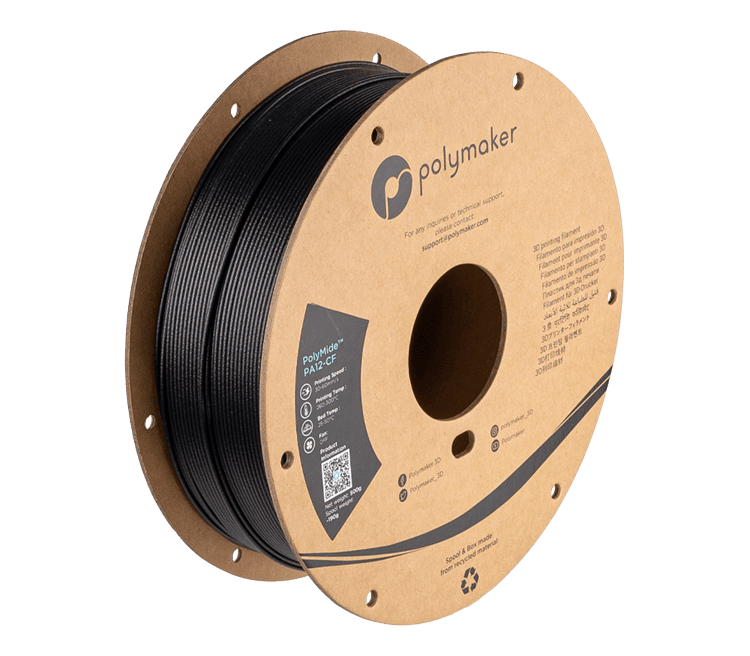
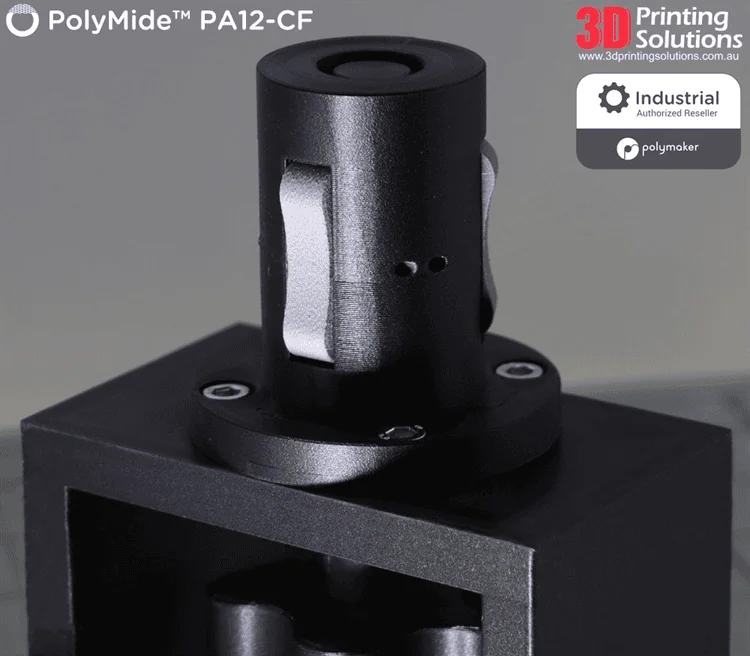
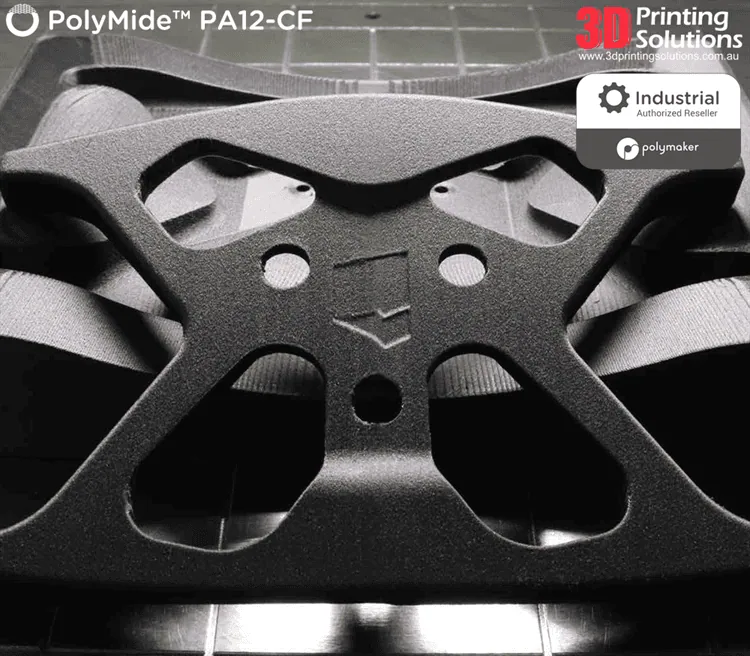





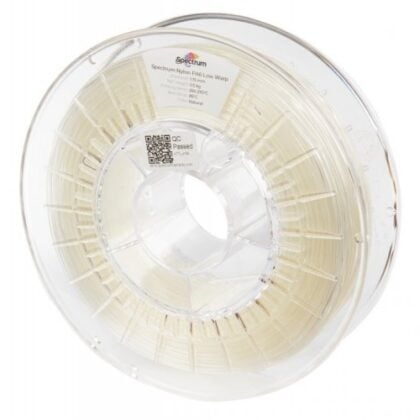




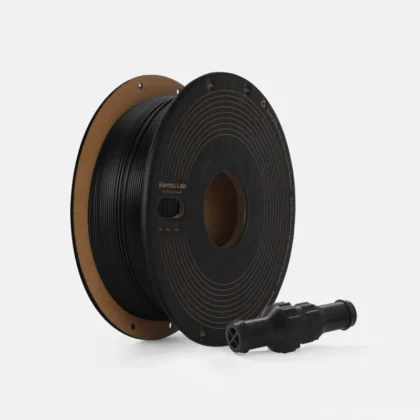



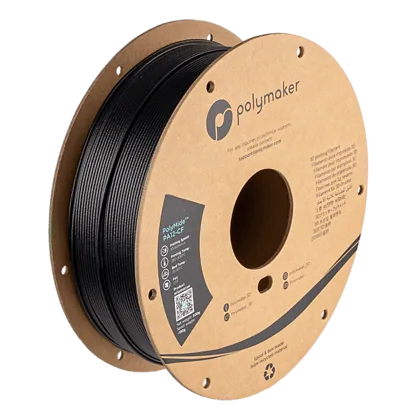
There are no reviews yet.